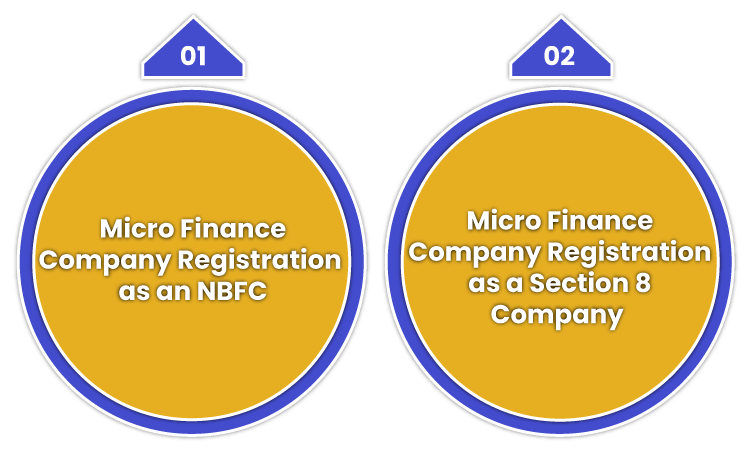Micro Finance Company Registration: Advantages and Disadvantages

Japsanjam Kaur Wadhera | Updated: Mar 08, 2021 | Category: Microfinance Company, RBI Advisory
Micro Finance Companies are the financial institutions that provide loans and advances to the low- income group of people where the financial requirement is less as compared to the other sectors of the society. Such class of group generally do not have the access to the traditional financial institutions such as banks. The Micro Finance Companies offer small loans to the various small households or businesses and is a huge support to all the agricultural and rural development including income and employment creation. The Micro Finance Company registration can be done either as an NBFC or as a Section 8 company. This article will discuss about the micro finance company registration and its advantages and disadvantages.
Table of Contents
Why is there a need for Micro Finance Company?
The Micro Finance Companies are needed as it serves the following purposes:
- It provides financial assistance to those enterprises which cannot place security or collateral.
- It encourages and motivates women entrepreneurship.
- It provides support to startups.
- It also offers assistance for nominal amounts that are generally funded as loans in hand.
- It provides foe legal or formal status for the process of lending and therefore, brings discipline in borrowings by the low- income groups. Through this, the over- borrowing is prevented and it reduces any complications arising out of the high future debts.
Micro Finance Company registration (NBFC and Section 8 Company)
The micro finance company registration can be done as an NBFC or Section 8 Company:

Micro Finance Company Registration as an NBFC
- In order to register the Micro Finance Company as an NBFC, the first step is to form a public or a private company. Minimum of 7 members are required to form a public limited company and a minimum of 2 members are required to form a private company.
- The next step is to raise the required minimum net owned funds of Rs. 5 crore. The requirement is of Rs. 2 crore for the north-eastern region.
- Once the capital is collected, it is required to be deposited in a bank as a fixed deposit and “No lien” certificate is to be obtained for the same.
- Further, the NBFC is required to fill an online application for the license and submit it along with all the necessary documents. The applicant must also submit the hard copy of the application and license at the regional office of the Reserve Bank of India (RBI).
Documents required
- Memorandum of Association (MOA) and Articles of Association (AOA).
- Copy of Board Resolution.
- Certificate of Incorporation of Company.
- Copy of auditor’s report and receipt of fixed deposit.
- Banker’s certificate of No Lien stating the net owned worth.
- Company’s Banker’s report.
- Directors recent credit report.
- Directors net worth certificate.
- Professional/ educational qualification proof of the director.
- Income proof and KYC of the director.
- Work experience proof in the financial sector.
- Organizational structural plan.
Micro Finance Company Registration as a Section 8 Company
- The applicant is required to apply for the DSC and DIN. To authorize the E-form the DSC is necessary.
- Further, the applicant is required to apply for the name approval in the Form INC- 1. It is necessary that the name must suggest that it is registered as a section 8 company. Therefore, words like foundation, micro credit, sanstha etc must be used.
- Upon the name approval, the company is required to draft a MOA and AOA and file it along with all the necessary documents.
- Lastly, the applicant is required to file all Form INC- 12 along with the incorporation certificate and relevant documents in order to obtain the license.
Documents required
- Identity proof.
- Address proof.
- PAN Card of all the directors/ promoters.
- Photograph of all the promoters and directors.
- Proof of rental agreement or ownership of registered office.
- No Objection Certificate (NOC) from the owner.
- Applicable stamp duty as necessitated by the State.
- Any other relevant documents as required.
Advantages and Disadvantages of Micro Finance Company
Advantages
- Most of the micro finance companies take no securities or collateral for providing financial credit or loans. The less paper work and hassle free process makes it suitable option to approach micro finance companies for quick fundraising.
- Micro finance companies are not limited to provide emergency credit only but it is also capable of disbursing working capital loans, housing loans and business loans with minimum formalities and processing.
- Micro Finance Companies works towards helping the low- income groups and unemployed individuals by providing them with easy financial credit.
- The Micro finance companies can provide the funds for a startup, that is to an individual for setting up a business that has minimum investment and offers sustainable profit in he long run. Therefore, it ensures self- sufficiency and entrepreneurship for the lower income group.
Disadvantages
- Unlike traditional financial banks, micro finance company offer small loan amount and does not ask for securities or collateral against the credit or loan. Therefore, the disbursement of large loan amount is practically not possible in this case.
- The micro finance company since, do not follow traditional bank footprints, it charges a very high rate of interest unlike banks. Further, unlike banks the micro finance company collects funds through private equity to render the financial services. This means that micro finance company is under the relentless pressure to generate more profit for its investor, thereby forcing them to charge higher interest rates.
- In the absence of compliance and working protocols, the micro finance companies can adopt a harsh repayment approach which would be severe for those who would not be able to return the money in financial crisis. However, since these companies work under the strict compliance, yet they could manipulate its customer unethically for repayment.
Conclusion
The Micro Finance company registration involves simple process and is hassle free. The purpose of this type of entity is to take initiatives to serve to the low- income groups of the society. The above article has discussed fairly about the micro finance company registration and its advantages and disadvantages.
Also, Read: Step by Step Procedure for Micro Finance Company Registration














